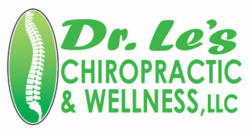Auburn Vitamin Deficiencies in Women Related to Fracture Risk
Fractures are enemies of Auburn women and men. They result in pain and long recoveries. Auburn postmenopausal women have a tendency to be at greater risk of fractures, particularly those who experience vitamin deficiencies. Auburn vitamin deficiencies are pretty [simple|easy]6] to test for and tackled with Dr. Le's Chiropractic & Wellness, L.L.C.'s help should testing reveal such deficiencies. Dr. Le's Chiropractic & Wellness, L.L.C. directs Auburn chiropractic patients who want to find out about their vitamin status with nutrition and address any deficiencies so as to reduce fracture risk.
VITAMIN DEFICIENCIES AND FRACTURE RISK
The more the merrier? Not really when it comes to multiple vitamin deficiencies! A new study described that the cumulative effect of vitamin deficiencies raised the risk of incident fractures in postmenopausal women. Vitamin D, vitamin K and vitamin B levels were recorded in women over 50 years of age and tracked for 6.3 years (plus or minus 5.1 years). 29.7% of these women had fractures during this time. The total of deficiencies (0/no deficiencies to 3/deficient in D, K and B) was significantly related to fracture risk. (1) In light of this report, Dr. Le's Chiropractic & Wellness, L.L.C. notices that it’s important to check for vitamin deficiencies and tackle them.
WHAT TO DO TO IMPROVE VITAMIN DEFICIENCIES AND AVOID Auburn FRACTURES
Dr. Le's Chiropractic & Wellness, L.L.C. notes that the risk of fragility fractures is higher than the risk of breast cancer for postmenopausal women. 33% are at risk. Luckily, Auburn fracture risk may well be controlled by healthy lifestyle modifications like vitamin supplementation, weight-bearing exercise, limited alcohol intake and no smoking. Vitamin supplementation incorporating at least 1000 mg/day of calcium, 800 IU/day of vitamin D, and 1 gram/kilogram of body weight of protein in women over 50 is recommended. (2) Vitamin D with calcium supplementation reduces the risk of total fractures by 15% and hip fractures by 30%, specifically. (3) Oral vitamin K supplementation (phytonadione and menaquinone-4) reduced bone loss. Menaquinone-4 demonstrated the strongest impact on vertebral fracture reduction. (4) And while vitamin B supplementation alone didn’t demonstrate a significant effect on osteoporotic fracture incidence in patients with cerebrovascular disease, it did reveal a modest impact. (5) Patients with very high plasma homocysteine levels and vascular disease appeared to benefit more from vitamin B supplementation (folate, B6, and B12) to prevent osteoporotic fractures. Vitamin B effectively modifies HCy levels thought to have a role in osteoporotic fracture and bone turnover. (6) Dr. Le's Chiropractic & Wellness, L.L.C. considers all types of factors when directing patients in nutritional supplementation.
CONTACT Dr. Le's Chiropractic & Wellness, L.L.C.
Listen to this PODCAST with Dr. Kevin Moriarty on the Back Doctors Podcast with Dr. Michael Johnson as he discusses chiropractic care of compression fractures with gentle Cox® Technic protocols.
Schedule a Auburn chiropractic visit with Dr. Le's Chiropractic & Wellness, L.L.C. to tackle any vitamin deficiencies and lessen your Auburn fracture risk!

